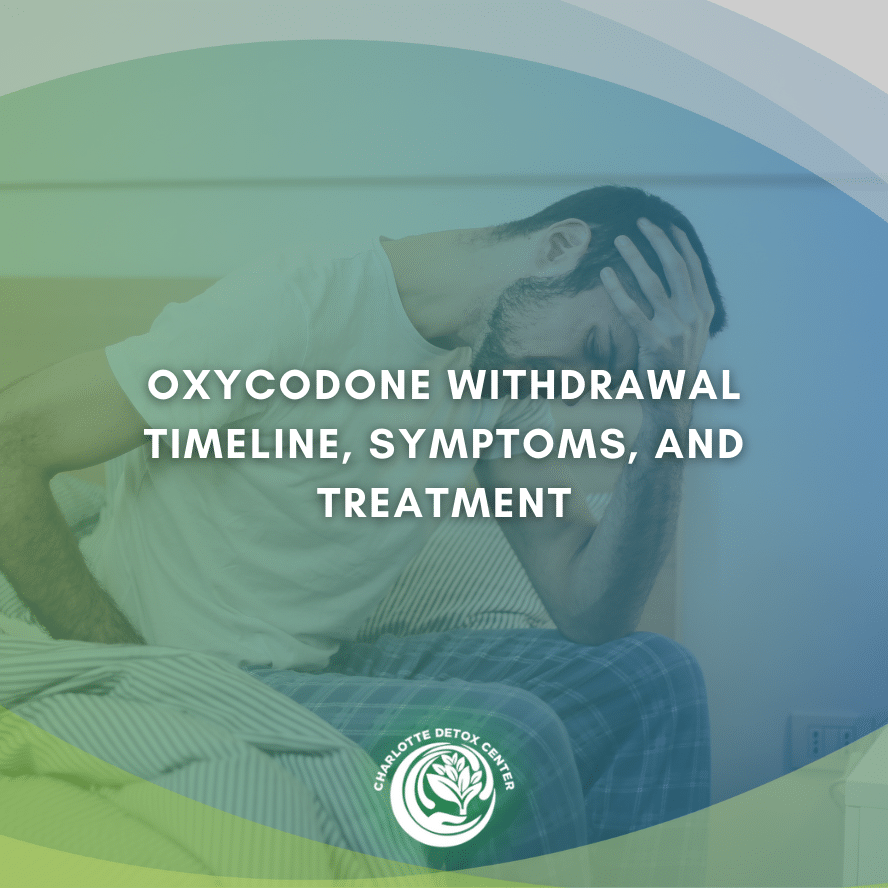Oxycodone Withdrawal Timeline, Symptoms, and Treatment

Medically Verified: 2/1/24
Medical Reviewer
Chief Editor

All of the information on this page has been reviewed and verified by a certified addiction professional.
Over 11.5 million people in the United States have abused opioid medications, including oxycodone.[1] In many cases, opioid painkillers are safe and effective at relieving moderate to severe pain. But these prescription drugs can be addictive, even when used under a doctor’s supervision. Anyone can develop a dependence on opioid drugs, regardless of other risk factors. Oxycodone addiction often causes severe damage to a person’s physical and mental health, relationships, and overall well-being.
The first hurdle people face in recovery from oxycodone addiction is withdrawal. Although the oxycodone withdrawal timeline varies from person to person, most people begin experiencing symptoms 8-12 hours after the first dose. Most people feel better after about one week. The safest way to detox from oxycodone is to do so at a medical detox facility.
What is Oxycodone?
Oxycodone is the active ingredient in many commonly-prescribed painkillers, including Percodan, OxyContin, and Percocet. Doctors typically prescribe opioid pain relievers to treat moderate to severe pain for a short period. But in addition to relieving pain, Oxycodone causes feelings of calm and euphoria that may make people want to take it in higher doses or for longer periods. Regular or heavy opioid use can lead to physical dependence and addiction.
Some signs of oxycodone addiction include:
- Using more of the drug than prescribed
- Needing to take more to get the same effects
- Wanting to stop taking the medication but being unable to
- Experiencing withdrawal symptoms if you don’t take Oxycodone
- Falling behind at work, school, or in your responsibilities at home
- Continuing to use Oxycodone despite negative consequences in your health, relationships, or safety
Oxycodone changes how a person’s body and brain work, making it very difficult to stop using the drug without professional treatment. For many with oxycodone abuse or addiction, detox is the first step of a comprehensive treatment plan.
Symptoms of Oxycodone Withdrawal
When someone with oxycodone addiction suddenly stops using the drug, they are likely to experience a range of uncomfortable symptoms. While oxycodone withdrawal isn’t often life-threatening, it is often so painful that many people relapse before detox is complete.
Oxycodone withdrawal symptoms include:[2]
- Nausea, vomiting, and diarrhea
- Depression
- Anxiety
- Coughing
- Runny nose
- Watery eyes
- Sweating
- Shaking
- Increased heart rate
- Irritability and mood swings
- Poor concentration
- Body or muscle aches
The length and severity of a person’s symptoms depend on how much oxycodone they have been using, their general physical and mental health, and other personal factors.
Oxycodone Withdrawal Timeline
Opioid withdrawal may feel like it lasts forever–but it won’t. Knowing what to expect during each phase of withdrawal may help you prepare and stay focused on completing detox. Many people who detox from oxycodone experience the following withdrawal timeline:
Day 1-2: For many, withdrawal symptoms begin within 8-12 hours of the last dose. You may experience the following:
- Joint pain
- Watery eyes
- Sweating
- Anxiety
- Loss of appetite
- Headache
- Muscle aches
Many people worry about what will come next or find these symptoms so distressing that they relapse. It’s essential to have support and treatment during detox to avoid an early relapse and have a safe, comfortable, complete detox.
Days 3-5: For most, symptoms are at their worst during this stage. You may experience shakiness, cramps, nausea, vomiting, and severe muscle aches. Many people relapse to relieve the discomfort of their withdrawal symptoms. Going through detox at a medical facility can give you the treatment and support you need to get through withdrawal without relapsing.
Days 6-7: Physical symptoms get better, but psychological symptoms worsen. Depression and anxiety are common. Many become irritable or desperate for relief from their symptoms. Without medical treatment, many people relapse during this period.
Day 8 and beyond: As the detoxification process is completed, most people find relief from their withdrawal symptoms. Some may experience guilt and remorse as the reality of their actions become clearer. Relapse is still possible without medical treatment.
What Happens During Oxycodone Detox?
During a medically-supervised detox program, medical professionals and addiction specialists will monitor and treat your withdrawal symptoms. Medications, including buprenorphine and methadone, can provide relief from your physical and emotional discomfort, and holistic therapies will support your healing.[3] You may also benefit from regular individual counseling sessions during detox.
After a complete opioid detox, you will begin a treatment program to treat addiction’s physical, behavioral, and emotional aspects. Treatment options include:
- Inpatient residential rehab
- Partial hospitalization program (PHP)
- Intensive outpatient program (IOP)
An addiction specialist will assess your needs and recommend the level of care you need to overcome your addiction.
Find Help for Oxycodone Abuse and Addiction Today
The majority of people who attempt to detox from prescription opioids on their own fail to have a complete detox. Most relapse before the process is complete, which can be discouraging or even dangerous. The support of a medically-supervised detox program can help you achieve a full detox from opioids and prepare you for success in a substance abuse treatment program.
You do not have to go through withdrawal alone. Medications, holistic therapies, and emotional support can help you have a safe, comfortable detox. Contact the Charlotte North Carolina Detox specialists today to learn how to start a detox program.
References:
